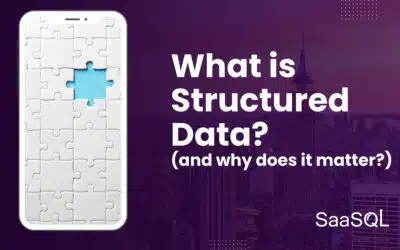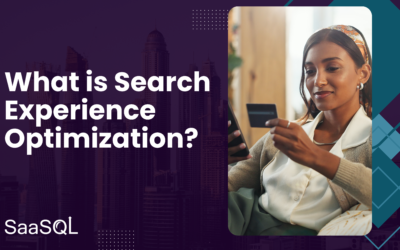I can’t help but marvel at the pace of technology, especially when it comes to SEO. I’m constantly captivated by the ever-evolving nature of SEO, with each new advancement leaving me eagerly awaiting what’s to come.
But recently, a particularly exciting shift has caught the attention of SEOs everywhere – one that combines two worlds in a way that has polarized SEO experts for the last 12 months, creating a mixture of excitement and dread: artificial intelligence and search engine optimization. Folks, we’re here…the launching ground of Generative AI SEO.

This isn’t just your typical core algorithm update; it’s an innovation set to revolutionize how we approach online content creation, website optimization and user experience. Think personalized content that perfectly matches user intent or automated meta descriptions crafted by intelligent algorithms for optimal rankings.
Today, we’re diving headfirst into the future of Generative AI SEO. We’ll cover a lot of the stuff we know for sure, and expand upon the stuff we can make an educated guess about. In the end, you’ll be well-positioned to capitalize on Generative AI SEO as a foundational strategy to engage with your target consumers.
Table Of Contents:
- Understanding Generative AI in SEO
- Google’s Generative AI Search Engine Revolution
- Impact and Opportunities of Generative AI on SEO Strategies
- Automation in SEO through Generative AI
- Ethical Considerations and Limitations of Generative AI in SEO
- Practical Applications and Tools for Implementing Generative AI in SEO
- FAQs in Relation to Generative AI SEO
- Wrapping Up
Understanding Generative AI in SEO
To begin our discussion of Generative AI in Search, we really need to start by digging in to A.I. as a functional SEO tool. By understanding the ways in which SEOs are currently using AI to execute SEO strategies, we can more easily connect the dots to everything that’s to come.
While we’ve previously covered some of the more foundational SEO Best Practices for 2024, Generative AI is on the immediate horizon and is poised to truly change the game. But how exactly does it work? And what impact will it have on your search engine strategy?
The Role of Generative AI in Content Creation
Creating content that speaks to users and maintains their attention is a critical component of any effective SEO strategy. This can be a labor-intensive process, but generative AI tools are making it easier.
You see, these smart tools use advanced language models to generate human-like text based on given inputs or prompts. They’re like digital writers that help you create everything from blog posts to product descriptions with greater efficiency.
OpenAI’s GPT-4, for example, has shown remarkable capabilities in this area.
An interesting fact here: 81.5% of SEO professionals report that generative AI has already had some effect on their SEO strategies while 72.4% anticipate positive benefits from its adoption.
Incorporating Generative AI into Your SEO Strategy
Implementing generative AI into your existing framework may seem daunting at first but rest assured – the potential rewards make it worth exploring.
To start off, consider using an AI tool as part of your keyword research efforts. These intelligent systems can analyze vast amounts of user search queries and competitor strategies to identify key trends and opportunities for optimization – something no human could do manually.
In addition to keyword analysis, generatively created content recommendations offer another powerful way forward. Think about meta descriptions – they play a crucial role by giving readers (and search engines) a snapshot summary of what’s inside; if they’re not compelling, your click-through rates can suffer. AI models can help you craft meta descriptions that are optimized for both user satisfaction and search engine optimization.
It’s not just about improving what exists either; generative AI technology is also empowering us to create new types of content altogether. For instance, the growth of voice search has led many marketers to leverage AI in order to optimize their content for this emerging channel. But more on that in a moment.
Key Takeaway:
Generative AI is a game-changer for SEO, serving as your digital writer that creates high-quality content efficiently. Not only does it help with keyword research and crafting optimized meta descriptions, but it also opens doors to new types of content like voice search optimization. Embracing generative AI in your SEO strategy can keep you ahead in the evolving digital landscape.
Google’s Generative AI Search Engine Revolution
The search landscape is changing. With Google’s shift towards a generative A.I. search engine, the way we optimize for SEO is transforming too.
The Power of Personalization with Google’s Generative A.I.
A significant factor in this transformation revolves around personalization. Imagine receiving content so tailored to your interests and preferences that it feels like every article or blog post was written just for you? That’s what Google’s RankBrain, an advanced algorithm powered by artificial intelligence, aims to achieve.
This personalized approach helps businesses make more meaningful connections with their audience online while enhancing customer satisfaction through relevant content offerings. It can lead to higher conversion rates because users are presented with exactly what they need when they need it.

For Google, it’s ultimately, it’s about eliminating decision fatigue when it comes to the user’s experience with search engines. Throughout overall lifecycle of Google’s constantly changing algorithm and user experience, the one constant has been a focus on the end user. Google has made $ Billions by placing their attention and the ways in which consumers make decisions, and being dedicated in their efforts to efficiently guide the buyer journey.
Google understands that shopping for anything major can feel like navigating a maze. Endless options, conflicting reviews, and ever-changing prices leave you drowning in information. By modifying the algorithm each year and creating increasingly complex personalization systems, Google has made every effort to simplify this process. But what if it were possible for consumers to truly cut through the clutter and find the perfect fit, fast?
In theory, generative AI in Search does just that. Unlike traditional search, which was designed to provide a list of suitable options for research, generative AI is intended to become your trusty research sidekick, whispering insights and possibilities directly in your ear. Forget generic, static product descriptions, SERP results. H1 tags and meta descriptions. Imagine vibrant snapshots of what matters most: real user experiences, pros and cons laid bare, thoughtful examinations, prices that dance with your budget, and visuals that make you say, “Oh, that’s the one!”
This isn’t just another algorithm update. When executed to its full potential, Google’s Generative AI search experience will be a living, breathing beast of knowledge housing over 35 billion product whispers. Every hour, 1.8 billion listings get a fresh coat of paint, ensuring you get the latest scoop, always.
As with all software programs, the core focus is on developing a platform that reduces the time in which users are not on the platform. If you think about it, every search engine result…every link you click, takes you further away from Google, further away from your core source of data and insights that drives your behavior, and reaps vast profits for the publisher. And because Google values user experience above all else, the ability to lock people within the Google experience is really about helping them avoid decision fatigue, coming to clear and concise conclusions without ever needing to leave the SERP. With generative AI, shopping becomes a joyful discovery, not a tedious chore. Find what you truly need, effortlessly, and rediscover the thrill of that perfect purchase.
if you’re wondering how all of this happens…we’ll give you some clear answers. If you’re contemplating how this impacts Search Engine Optimization, and the ongoing efforts of local businesses to maximize their value within the Search Engine Results page, well, we’re going to take our best shot at providing am explanation.
First, Let’s Make Sense of Complex User Search Queries
In simple terms, Google leverages machine learning algorithms and natural language processing (NLP) capabilities embedded within its generative AI models. This allows them to understand user search queries better than ever before— even those unique long-tail searches that traditional keyword-focused approaches might miss out on.
For instance, if someone asks “where can I get a vegan pizza near me?” – instead of merely focusing on keywords like ‘vegan’ and ‘pizza,’ the new model will analyze vast amounts of data including past searches related to dietary choices and location history — delivering customized results specific not only to vegan pizza places but also considering proximity based on historical geolocation data.
Think of it this way: Traditional search engines were like librarians who scanned book titles for your keywords. They did a good job finding relevant texts, but they didn’t really understand what you were looking for.
Generative AI models are like your super-powered research assistants. They listen to your questions (not just the keywords), dip into a vast library of knowledge, and even ask you clarifying questions to truly grasp your intent. They then deliver tailored answers that fit your specific needs.
In the “vegan pizza near me” example:
Keywords: “vegan,” “pizza,” “near me.”
Old approach: Shows pizza places with “vegan” in their description, regardless of distance or user’s preferences.
Generative AI:
- Analyzes your past searches: Did you search for vegan restaurants before?
- Considers location history: Are you at home, work, or somewhere else?
- Uses NLP to understand intent: Do you want delivery, dine-in, or takeout?
Result: Personalized recommendations for nearby vegan pizza places matching your preferences and location.
Benefits:
- No more keyword guessing: Ask questions naturally, like a conversation.
- Unique searches covered: Find what you need, even with specific or obscure queries.
- Relevant and customized: Get results tailored to your preferences and context.
- Effortless exploration: Discover new options you might have missed before.
This is just a glimpse into the power of generative AI in search and the ways in which Generative AI SEO is going to shift the way we think about website optimization. For the consumer it’s like having a personal guide on your information journey, making it faster, easier, and even more rewarding. For SEO’s, it’s a matter of understanding the way in which generative AI systems will interact with content and provide it to the end user.
Leveraging AI Tools For Improved SEO Strategies
OpenAI’s GPT-4 and other generative AI tools play a crucial role in this process. These powerful resources help analyze user behavior, understand search intent, and even optimize content for voice search — a rapidly growing trend.
These models go beyond static search queries. They analyze user clicks, scrolling patterns, voice commands, and even interactions with AI assistants like Google Assistant. By understanding what users do after searching, GPT-4 can predict their true intent and refine future search results. Imagine searching for “hiking backpacks” and then seeing results categorized by difficulty level, preferred features, and even recommendations based on your fitness tracker data.

But GPT-4 isn’t just a keyword robot. It uses NLP (natural language processing) to grasp the nuances of language. It can differentiate between “best restaurants near me” and “restaurants with the best outdoor seating for a romantic dinner.” This allows it to deliver results that are not only relevant but also personalized to your specific needs and context.
As voice assistants become ubiquitous, understanding spoken language becomes crucial. GPT-4, trained on vast amounts of voice data, can analyze voice search queries and predict user intent even more accurately than text. This helps optimize content for voice searches, ensuring your website shows up when people ask their smart speakers questions relevant to your business.
If you’re thinking these AI tools are game-changers, you’re right. They unlock a treasure trove of data about how people interact with search, revealing insights previously hidden in plain sight. We can learn, for example, what kind of content resonates best with specific demographics, which keywords trigger emotional responses, and how people prefer to consume information through voice search. This data empowers us to tailor our online presence to user preferences and optimize content for maximum impact.
No wonder 68% of SEO experts are jumping on board. Automated processes powered by large language models can handle tedious tasks like keyword research and content optimization, freeing up human expertise for strategic planning and creative content creation.
What’s more, as it relates to Generative AI SEO strategies, this is really just the tip of the iceberg. As generative AI evolves, we can expect even more profound changes in search and online marketing. They’re giving us new insights into our online presence, which was unthinkable before. Ultimately, the future looks bright for those who embrace these powerful tools and unlock their potential to connect with users in a more meaningful and effective way.
Key Takeaway:
Google’s generative AI is reshaping SEO by delivering personalized content that feels tailor-made for each user. By understanding complex search queries, and using tools like OpenAI’s GPT-4 to analyze user behavior and optimize content, businesses can form deeper connections with their audience online. In this way, Generative AI SEO is the continued shift towards more relevant user experiences that not only enhances customer satisfaction but also boosts conversion rates.
Impact and Opportunities of Generative AI on SEO Strategies
The intersection of generative AI and SEO is not just a trend, it’s a seismic shift. As we move forward into the future, this fusion will shape our digital marketing landscape in ways unimaginable today.
The Future of SEO with Generative AI
Let’s look at high-quality content first. Content has always been king but with the rise of generative A.I., it’s becoming an empire. The machine learning algorithms behind these models can generate human-like text that appeals to both users and search engines alike, offering valuable insights for readers while boosting conversion rates.
But why stop there? Think about personalized content creation based on user behavior or even voice searches – areas where generative AI tools have enormous potential to improve customer satisfaction. In fact, 37% of executives predict significant impacts from such technology on their current strategies.
To give you some context and help provide some context as it relates to Generative AI SEO: Imagine you run an online store selling customized T-shirts. You need product descriptions that are not only enticing but also optimized for search intent across different demographics. Instead of spending hours crafting each description manually (or hiring someone else to do so), leveraging advanced language models could streamline this process significantly.
In turn, your customers receive more relevant recommendations when browsing through your collection – driving higher conversion rates as well as improving overall customer experience. From a Generative AI SEO perspective, the intent is to proactively create these user experiences through structured data, and content.
Beyond Just Search Engine Optimization
Moving beyond traditional engine optimization tasks like keyword research or meta-tagging; think how helpful generatively-created blog posts could be. These posts won’t merely focus on incorporating targeted keywords but rather they’ll be structured around the needs and interests of your audience, further enhancing user engagement.
AI can help to sift through massive amounts of data and gain understanding into how customers act. By understanding what drives their searches and interactions on your site, you’ll be able to optimize content accordingly – a task made easier with the power of generative AI.
Beyond Keywords: Content Tailored to Soulmates, Not Search Bots
AI-powered blog posts: Imagine generating engaging, informative blog posts that feel crafted by hand, not machines. Forget clunky keyword-stuffed content; AI can analyze audience demographics, interests, and preferences to create content that resonates on a deeper level. In this way, a Generative AI SEO friendly tactic might be blog posts that address your audience’s pain points, answer their unspoken questions, and offer actionable solutions. This builds trust, fosters engagement, and keeps them coming back for more.

Personalized content experiences: Go beyond generalized blog posts. AI can generate content that dynamically adapts to individual users based on their search history, website interactions, and even social media profiles. Imagine a travel blog that curates personalized itineraries based on the reader’s preferred travel style and budget. This level of customization creates a seamless user experience and boosts engagement like never before…and those experiences require Generative AI SEO tailored content.
Data-Driven Understanding: From Actions to Insights
Decoding customer behavior: When it comes to technically executing a Generative AI SEO strategy, large language models become a source of immense value. AI can analyze massive amounts of user data, from website clicks to social media comments. This reveals hidden patterns and insights into what truly drives your customers’ searches and interactions. You’ll understand what type of content resonates best, what questions they have, and even their emotional triggers. This empowers you to tailor your content and marketing efforts to their specific needs.
Predictive optimization: By analyzing user behavior trends, AI can predict future search queries and user preferences. This allows you to stay ahead of the curve and proactively create content that addresses anticipated needs. Imagine anticipating seasonal trends and crafting relevant blog posts before potential customers even start searching. This kind of foresight gives you a powerful edge in the Generative AI SEO game.
The Power of the Partnership: Human + AI, the Dream Team
When it comes to Generative AI SEO, it’s crucial to remember that AI is not a replacement for human expertise. Instead, it’s a powerful partner that augments your creativity and strategic thinking. AI can handle the heavy lifting of data analysis, content generation, and optimization, freeing up your human team to focus on the bigger picture. This allows you to:
Focus on strategy and creativity: While AI generates content, humans can define the overall content strategy, ensure brand voice and tone remain consistent, and add that extra touch of human polish.
Refine and personalize: AI-generated content can be a fantastic starting point. Humans can then personalize it further, adding unique anecdotes, insights, and calls to action.
By combining the power of AI with human creativity and Generative AI SEO strategic thinking, you can create a truly unstoppable SEO force. So, embrace the future, open your doors to generative AI, and watch your content rise to new heights of engagement and effectiveness.
Remember, the future of SEO is not about manipulating search engines; it’s about understanding your audience and delivering content that truly resonates with them. AI is the tool that can help you achieve that, enabling you to build deeper connections and achieve lasting success.
Generative A.I SEO: A Whole New World for Optimization
With AI shaping the SEO landscape, we’re stepping into an era of uncharted potential that’s truly exciting.
Key Takeaway:
Generative AI SEO is transformative, creating a seismic shift in digital marketing. It’s making content creation more personalized and relevant, boosting conversion rates by understanding user behavior better than ever before. Imagine generating engaging product descriptions effortlessly or crafting blog posts tailored to your audience’s needs – all possible with the power of generative AI. This isn’t just about improving search engine rankings; it’s about reshaping customer engagement for an exciting future.
Automation in SEO through Generative AI
The world of SEO is transforming quickly, with generative AI taking the forefront. This change has seen businesses leaning towards automated processes to analyze vast amounts of data for improved online presence.
Enhancing Efficiency with Automated Content Analysis
A key benefit brought by automation in SEO tasks is enhanced efficiency. When it comes to content analysis, generative AI tools like SEMRush’s Content Analyzer, play a pivotal role.

Manually examining structured data can be a laborious process and potentially lead to errors. However, using these sophisticated algorithms helps reduce the workload and improves accuracy by leveraging machine learning capabilities.
This shift toward automation isn’t just about convenience or speed – it’s also fueled by results. Recent studies show that 13.3% of professionals want help from generative AI not only for analyzing content but also creating high-quality product descriptions tailored to user search queries.
Further down the line, around 11.1% are keen on generating more engaging blog posts while 10.7% wish for assistance when managing their vast structured data effectively.
Interestingly enough though, there are still those who remain hesitant about fully embracing this new wave of technology – approximately 7.5%. But one thing’s clear: as we continue advancing into an increasingly digital age where information overload becomes commonplace; adopting innovative strategies such as these will undoubtedly become integral parts of any modern business’s survival strategy to thrive amidst the stiff competition prevalent in today’s market environment.
The practicality behind integrating artificial intelligence within your existing framework doesn’t stop here. The integration goes beyond providing personalized content recommendations based on customer satisfaction ratings; it also allows for the optimization of meta descriptions and blog posts, keeping your content fresh and relevant.
Generative AI SEO is paving the way for a future where tasks are becoming more efficient and innovative. It’s clear that adopting these technologies now will give businesses an edge in our rapidly changing digital world.
Key Takeaway:
Generative AI is transforming SEO, making it more efficient and accurate. It’s not just about speed or convenience – it’s driven by results. With tools like SEMRush’s Content Analyzer, businesses can automate content analysis for improved online presence. And despite some hesitations, the move toward AI integration in SEO tasks shows no signs of slowing down. From personalized content recommendations to optimized meta descriptions, generative AI holds the key to thriving in a competitive digital landscape.
Ethical Considerations and Limitations of Generative AI in SEO
As we move into the era of generative AI SEO, it’s also crucial to consider the ethical implications. Risks tied to authenticity can arise, questioning whether content created by an AI tool holds as much value as that written by a human.
Navigating Ethical Concerns in Generative A.I.
The use of Generative AI SEO strategies bring up myriad concerns about quality control, ethical access to data and transparency with the consumer. While machines are becoming increasingly proficient at mimicking human-like language models, there remains an underlying question: Can they truly understand user search queries or emotions?
This dilemma leads us back to Google’s definition of quality content: E-E-A-T (Expertise, Authoritativeness, Trustworthiness), which will play an increasingly crucial role in Generative AI SEO. With more reliance on generative AI tools like GPT-4 from OpenAI for writing product descriptions or blog posts, maintaining high levels of E-E-A-T could be challenging.
The Mimicry vs. Understanding Gap
Surface-level fluency: AI models like GPT-4 can indeed mimic human language with impressive fluency. They can churn out grammatically correct, even engaging, texts. However, understanding the nuances of language, the deeper meaning behind user queries, and the emotional undertones often go amiss. Imagine an AI-generated blog post discussing financial hardship written with perfect grammar but lacking empathy or real-world understanding. This could not only harm your E-E-A-T but also alienate your readers.
Contextual blind spots: AI still struggles with context sensitivity. A product description for a camping tent might mention its waterproof nature without considering the user’s planned camping location or weather conditions. This lack of context can lead to inaccurate or misleading information, undermining your trustworthiness.
E-E-A-T in the Age of Generative AI SEO
Maintaining human oversight: The key to preserving E-E-A-T with Generative AI SEO content lies in responsible and mindful implementation. Human oversight remains crucial. Editors need to fact-check for accuracy, ensure context-sensitivity, and inject the human touch that AI lacks. Think of human expertise as the rudder guiding the AI ship, ensuring it stays on course.

Evolving evaluation metrics: Traditional SEO metrics focused on keyword targeting and backlinks might not suffice in this new paradigm. We need new evaluation frameworks that assess the quality of AI-generated content based on its accuracy, context-sensitivity, value for users, and emotional resonance. This will help us ensure E-E-A-T even with AI content in the mix.
The Road Ahead for Generative AI SEO: Partnership, not Replacement
The future of Generative AI SEO doesn’t lie in replacing human expertise with AI, but in leveraging their unique strengths in a synergistic partnership. Here’s how:
AI for efficiency: Let AI handle tasks like large-scale data analysis, content generation for initial drafts, and SEO optimization legwork. This frees up human time for high-level strategy, creative content creation, and E-E-A-T maintenance.
Human for soul: Humans bring the empathy, context understanding, and emotional intelligence that AI currently lacks. They can ensure E-E-A-T by fact-checking, editing, and adding the human touch that builds trust and resonates with users.
By working together, AI and humans can create a powerful Generative AI SEO force that not only improves rankings but also builds meaningful connections with the audience. Remember, E-E-A-T is ultimately about trust, and trust stems from authentic, valuable, and contextually-aware content. AI can be a valuable tool in this journey, but the human factor remains irreplaceable.
At the end of the day, none of this is possible without robust systems capable of assessing not just if these language models sound natural but also if they provide valuable insights and accurate information with context sensitivity intact—something humans excel at but machines still struggle with due to their lack of real-world experience and emotional understanding.
Leveraging Benefits while Recognizing Limitations
Despite its limitations concerning ethics and quality control, using artificial intelligence isn’t all doom-and-gloom; far from it. There’s no denying how machine learning has transformed many aspects within digital marketing – from personalized content recommendations based on user behavior analysis to leveraging AI technology for analyzing vast amounts of competitor strategies data quickly and efficiently.
However, and this is key, while AI algorithms can generate relevant content faster than any team of copywriters ever could, their ability to replicate the nuances of human thought and emotion is far from perfect. This begs careful usage and monitoring on the part of businesses and enterprises.
Finding a balance between AI and human input is essential. Leveraging Generative AI SEO tasks like meta descriptions and voice search optimization can provide valuable insights and drive customer satisfaction. But these should not replace human touchpoints entirely—rather, they need to work hand-in-hand with them.
Key Takeaway:
Generative AI in SEO sparks ethical debates, with concerns over authenticity and quality control. But remember, it’s about balance. Use AI to boost tasks like meta descriptions or voice search optimization. Yet, don’t forget the human touch—AI hasn’t mastered context sensitivity or emotional understanding yet.
Practical Applications and Tools for Implementing Generative AI in SEO
The landscape of search engine optimization is evolving, with generative AI playing a crucial role. To stay ahead, it’s important to understand how to effectively implement this technology into your current SEO strategy.
Utilizing Tools for Effective Implementation
For advanced SEO professionals, high-perplexity language models (HPLMs) like Jurassic-1 Jumbo or Megatron-Turing NLG are no longer science fiction. They’re powerful tools unlocking a treasure trove of data insights and optimizing content strategies for next-level customer satisfaction. Let’s dive deeper into how these advanced models can take your SEO game to the next level
Unmasking User Intent with Precision
HPLMs go beyond basic keyword analysis. They delve into the nuances of user behavior, analyzing vast amounts of data from search queries, website clicks, voice commands, and even social media interactions. This allows them to infer user intent with an accuracy that traditional SEO tools simply can’t match. Imagine understanding not just what users are searching for but also why they’re searching for it. This insights-driven approach lets you create content that truly resonates with their needs and emotions, leading to deeper engagement and higher conversion rates.
Voice Search Optimization: Using Generative AI SEO to Speak Your Customers’ Language
With voice search on the rise, understanding how users interact with AI assistants is crucial. HPLMs can analyze voice search queries, identify trends and common conversational patterns, and even generate voice-optimized content that resonates with users’ natural language. This ensures your website appears in voice search results and delivers the information users need in a format they prefer.
These are just a couple of reasons that, according to recent stats, 13.6% of executives and senior managers prioritize using these innovative technologies in their work processes.
This adoption isn’t surprising when you consider the practical applications that come with leveraging AI capabilities in Generative AI SEO tasks – especially when it comes down to creating high-quality product descriptions or personalized blog posts aimed at improving user experience.
Navigating the Landscape with Generative A.I.
An understanding of how generative A.I works plays a key role here: essentially, by analyzing vast amounts of existing online content – blogs posts, meta descriptions etc., – an intelligent model like GPT-4 learns patterns associated with effective SEO practices; everything from keyword usage and density to natural language processing techniques that drive higher conversion rates.
We’re talking about machine learning algorithms which gain insights through studying millions (even billions) more examples than any human could ever handle. Note: this doesn’t mean you should entirely hand over your content creation process. The tool needs guidance so its output aligns well within your specific business context.
Personalized Content and User Satisfaction
Another game-changer brought about by AI technology is the ability to generate human-like, personalized content. With advancements in natural language processing, these models can understand user search intent better than ever before.This means that your online presence could provide valuable insights and recommendations tailored specifically for each visitor.
The personalized content aspect of Generative AI SEO is indeed a game-changer, and it goes far beyond simply understanding user intent. Here are some exciting ways it can transform your online presence:
Dynamic Customer Journeys: Imagine your website transforming into a chameleon, adapting to each visitor’s needs and preferences in real-time. AI can analyze past behavior, interests, and search history to dynamically curate product recommendations, blog posts, and even website layouts. This creates a personalized customer journey, enhancing engagement and conversion rates.
Micro-Targeting Mastery: Forget broad keyword targeting. AI allows you to reach micro-niches like never before. Imagine crafting content for “vegan backpackers looking for eco-friendly hiking gear in Colorado.” This level of specificity resonates deeply with users, building trust and establishing your brand as the ultimate authority in their niche.
A Multi-Sensory Experience: Personalized content isn’t limited to text. AI can generate personalized video recommendations, curate dynamic image galleries, and even adapt website color palettes and music based on user preferences. This multi-sensory approach keeps users engaged, creates a memorable brand experience, and fosters emotional connections.
Predictive Content Powerhouse: AI can analyze user trends and predict future search queries, allowing you to stay ahead of the curve. Imagine crafting blog posts about winter camping gear before the first snowflakes fall, or creating video tutorials on new smartphone features before they’re even released. This proactive approach positions you as a thought leader and keeps users coming back for more.
The Human Touch, Amplified: AI isn’t here to replace human creativity; it’s here to amplify it. Imagine content creators using AI to brainstorm new ideas, research relevant topics, and generate drafts to be refined and personalized. This allows humans to focus on the strategic aspects and inject their unique voice, ensuring a perfect blend of AI efficiency and human magic.
By embracing personalized content powered by AI, you can transform your online presence from a static website into a dynamic, responsive ecosystem that fosters trust, engagement, and lasting customer relationships. Remember, with a Generative AI SEO strategy, it’s no longer about shouting the loudest; it’s about whispering directly into the ears of your ideal customers, offering them exactly what they need, exactly when they need it.
Key Takeaway:
Embracing generative AI can transform your Generative AI SEO strategy. By using advanced tools, you can analyze competitor data and optimize voice search. With these insights, create personalized content that boosts user satisfaction. Remember, while AI offers a huge leap forward, it still needs guidance to align with your business context.
FAQs in Relation to Generative AI SEO
How will Generative AI SEO change the overall SEO landscape?
Generative AI is set to supercharge SEO. It can help create high-quality, personalized content that boosts search rankings and user experience.
Is there an AI for SEO?
Absolutely. Tools like OpenAI’s GPT-4 or Google’s RankBrain use advanced algorithms to improve various aspects of Generative AI SEO such as keyword research, content creation, and optimization.
What does generative AI mean for websites and SEO?
For websites and SEO, generative AI means more personalization. This leads to better engagement rates, improved conversion rates, and higher visibility in search results.
Is AI content SEO friendly?
You bet it is. When done right with tools like SEMRush’s Content Analyzer or OpenAI models, the produced content aligns well with both users’ needs and search engine requirements. Ultimately, a focus on Generative AI SEO is a focus on the most content-focused elements of a traditional SEO strategy.
Wrapping Up
As we wrap up our comprehensive overview of the captivating, challenging, not entirely certain world of Generative AI SEO, the core takeaway is that content will continue to be king, and personalized user experiences will be central to any SEO effort.
While we’ve delved into Google’s generative A.I. evolution, and witnessed numerous examples of how personalization is transforming search results, we’ve also covered some of the ways in which large language models can help enhance efficiency with automated content analysis and have explored potential ethical considerations like authenticity and quality control in generative A.I..
Most importantly, we looked at practical applications for implementing this game-changing technology effectively using various tools available today.
To stay ahead in the ever-evolving digital landscape, harnessing the power of a Generative AI SEO will rapidly become a necessity.







